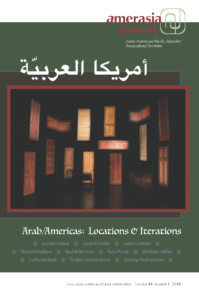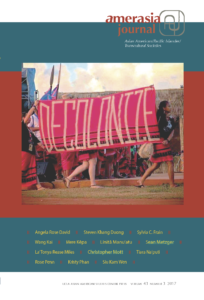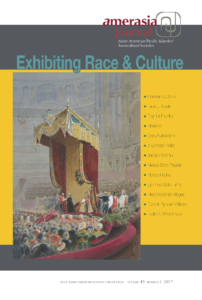Amerasia Journal announces the publication of “Arab/Americas: Locations & Iterations,” a timely project that cultivates exchanges between Arab American studies and Asian American studies. Guest edited by Sarah Gualtieri (University of Southern California) and Pauline Homsi Vinson (Diablo Valley College), “Arab/Americas” explores the relationships between these two fields vis-à-vis the historical, cultural, and political dimensions of citizenship, labor, migration, and trade in Europe, Mexico, the Middle East, and the United States.
 The historical and political intersections uniting Arab America and Asian America go back to the early twentieth century—immigrants from Ottoman Syria sought entry into the United States by defining their racial identities in response to immigration law restricting Chinese labor. Yet as with the case of Asian immigrants, such attempts by Syrians and Lebanese to shape their identities were confronted by nationalistic concepts of race. As the guest editors explain, “The shift from self-identification with whiteness to affiliation with ethnic minorities and people of color in the United States is evident in recent scholarship on Arab Americans.”
The historical and political intersections uniting Arab America and Asian America go back to the early twentieth century—immigrants from Ottoman Syria sought entry into the United States by defining their racial identities in response to immigration law restricting Chinese labor. Yet as with the case of Asian immigrants, such attempts by Syrians and Lebanese to shape their identities were confronted by nationalistic concepts of race. As the guest editors explain, “The shift from self-identification with whiteness to affiliation with ethnic minorities and people of color in the United States is evident in recent scholarship on Arab Americans.”
Contributions by Randa Tawil and Rana Razek demonstrate that such articulations of race were expressed in early Syrian American literature as well as government documentation. Broader historical lessons are gleaned from Louise Cainkar’s essay. Cainkar traces how Arabs transformed from being “not quite white” Syrian immigrants to a “Middle Eastern” threat in the wake of 9/11. Cainkar powerfully suggests that “the racial project that ensnared Arab Americans eventually expanded to South Asians via its ideological extension to Muslims, the deployment of the socially constructed ‘Middle Easterner,’ and its oracular representation as a ‘type of brown’ terror threat.”
“Arab/Americas” also examines how Arabs and Muslims have used cultural forms to challenge racial structures in the U.S. and elsewhere. Maryam Kashani describes the “Tranquility Amidst Turmoil” tour (2011), in which Habib Umar bin Hafiz, a descendent of the Prophet Muhammad, imagined a broad multi-ethnic and global collective of companions to promote an anti-racist praxis. Carol Fadda illuminates how poetry has offered contemporary artists a way to disrupt prevailing stereotypes of Arabs across gender, while Rachel Norman elaborates how novelists reflect on Arab North American identity, focusing specifically on the relationship between matriarchal figures and food. The issue features an interview with Torange Yeghiazarian, Founding Artistic Director of Golden Thread Productions, the first theatre company focusing on the Middle East, and a spotlight on the Arab American National Museum, based in Dearborn, MI. Amy Tang’s Repetition and Race is reviewed.
Published by the UCLA Asian American Studies Center since 1971, Amerasia Journal is regarded as the core journal in the field of Asian American studies.
ABSTRACTS
“Arab/Americas” – Sarah Gualtieri (University of Southern California) and Pauline Homsi Vinson (Diablo Valley College)
The editors’ introduction essay provides background on Arab American studies and its intersections with Asian American studies. The introduction outlines the history of Arabs in the United States, tracing early immigration at the beginning of the twentieth century to shifts in racial identification. The editors offer summaries of the essays collected in the special issue.
“Arab, Asian, and Muslim Feminist Dissent” – Carol W.N. Fadda (Syracuse University)
This essay delineates a cross-racial and relational framework that connects the study of Asians, Arabs, and Muslims, in order to challenge the tightly regulated boundaries of national discourse upholding the violence of nation-states in the ongoing “Global War on Terror.” To further elucidate the value of such a relational framework, the essay examines poetic strategies and formulations of feminist dissent by Muslim artists of Arab and South Asian background that lie outside reductive frameworks of inclusion, tolerance, and cooptation. Using poetry to delineate and analyze politics of refusal and dissent, it focuses on poems by Mohja Kahf, Suhaiymah Manzoor-Khan, and Dareen Tatour. The work of these poets exemplifies certain disruptive and subversive feminist strategies for countering hegemonic discourse about racialized identities.
“Fluid Terror Threat” – Louise Cainkar (Marquette University)
Using a framework of racial ideologies and practices as well as Michael Omi and Howard Winant’s articulation of racial projects, this article demonstrates the ways in which Arab Americans have been racialized and account for why this process has produced some consequences that differ from those of historically racialized groups. The essay argues that although their history with race is different from that of East and South Asian Americans, the racial project that ensnared Arab Americans eventually expanded to include South Asians via its ideological extension to Muslims, the deployment of the socially constructed notion of the “Middle Easterner,” and its representation as a “type of brown” terror threat. This ideological and representational convergence manifests itself in government policies and macro- and micro-popular practices that simultaneously target Arabs, Muslims, and South Asians, and persons perceived to be members of these groups.
“Habib in the Hood” – Maryam Kashani (University of Illinois at Urbana-Champaign)
Throughout the “Tranquility Amidst Turbulence” tour (2011), Imam Zaid Shakir, Habib Umar ibn Hafiz (a descendent of the Prophet Muhammad), and others invoked the Companions and other historical figures like Malcolm X, El-Hajj Malik El-Shabazz (1925-1965) and the African Muslims who were transported to and enslaved in the Americas in order to localize and historicize Muslim experiences in the Americas. This article engages with these invocations to make two theoretical interventions. Firstly, Islamic companionship and legacies of suffering and liberatory praxis offer Muslims and others “liberatory lineages” that enable an analysis of their material relations towards a relational formation beyond solidarity and allyship. Secondly, while these Muslim leaders enact an anti-racist praxis during the tour, the essay considers the indeterminacies and occlusions that emerge in the move from theory to praxis on a wider level.
“Racial Boundaries” – Randa Tawil (Yale University)
This article argues that, during World War I, writer Ameen Rihani articulated a form of Syrianness that could conform to a U.S. racial imagination in which Syria was an undefined space. Rihani used American terms, contexts, and conditions to forge a Syrian identity that could also be mapped geopolitically. However, his international trip to Mexico revealed the limits of this political vision; Syrians in Mexico had a different relationship with the United States and race, which did not respond to Rihani’s agenda in the same way. Just as in the United States, local circumstances in Mexico informed diasporic politics of Syrians living there. This essay provincializes Syrian American politics and shows how racial regimes in the United States affected the way Syrians Americans articulated their own form of diasporic nationalism.
“Trails and Fences” – Rana Razek (University of California, Santa Barbara)
This article engages with and expands on a burgeoning literature on race and migration in Arab American and Middle Eastern studies, focusing on Syrian migration at the beginning of the twentieth century. Reflecting decades of ethnic studies scholarship and shifts in U.S. immigration history, studies of Arab American assimilation have given way to analyses of race and racial ambivalence—that Arab Americans are and have been “not quite white” in U.S. racial hierarchies. While Syrian migration histories transcend national borders, the fences that demarcated the borders and the trails that defied them had profound consequences for Syrian immigrants. Tracing immigrants’ serpentine journeys from Ottoman Syria to the threshold of the U.S. highlights the physical, emotional, and financial challenges of migration, but also networks and communities forged along the way.
“Eating the Matriarch” – Rachel Norman (University of North Carolina at Chapel Hill)
This essay surveys three representative works of fiction from the Lebanese diaspora in North America to examine the production and ingestion of food, focusing especially on the significance of ingestion for the matriarch. Beginning with Mexican Héctor Azar’s Las Tres Primeras Personas, I analyze the novel’s symbolic treatment of food and the female form, their conflation, and their ties to ethnic, cultural, and national identities. I turn to Canada and discuss the metaphoric and literal consumption of the matriarch in Fall on Your Knees by Ann-Marie MacDonald. Finally, I consider an alternative construction of gendered labor in Joseph Geha’s U.S. American novel Lebanese Blonde, which unyokes the female body and food and suggests a new direction for Arab American identity politics. This multinational and multilingual approach allows for a discussion of diaspora as a global phenomenon that illustrates how the female form has become a cardinal space for an Arab diasporic identity.
“ReOrienting Theatre”- Interview with Torange Yeghiazarian (Golden Thread Productions)
The Guest Editors of “Arab/Americas” conducted an interview online with Torange Yeghiazarian, Executive Artistic Director and founder of Golden Thread Productions. Based in San Francisco, Golden Thread Productions is the first American theatre company that primarily focuses on representations of the Middle East and the peoples of the region. In the interview, Yeghiazarian discusses the mission of Golden Thread Productions in creating dramatic productions about the Middle East, as well as potential overlaps between Arab American, Middle Eastern, and Asian American theatre
Community Spotlight: Arab National Museum
The Community Spotlight for this issue features a profile of the Arab American National Museum (Dearborn, MI), the only cultural institution in the United States to focus of the history, culture, and contributions of Arab Americans.
Book Reviews
Amy Tang’s Repetition and Race is reviewed by Thaomi Michelle Dinh (University of Washington)
ORDERING INFORMATION
Copies of the issue can be ordered via phone, email, or mail. Each issue of Amerasia Journal costs $15.00 plus shipping/handling and applicable sales tax. Please contact the Center Press for detailed ordering information.
UCLA Asian American Studies Center Press
3230 Campbell Hall, Los Angeles, CA 90095-1546
Phone: 310-825-2968 | Email: aascpress@aasc.ucla.edu
Facebook: http://www.facebook.com/AmerasiaJournal
Past Issues: http://uclajournals.org/loi/amer
Amerasia Journal is published three times a year: Spring, Summer/Fall, and Winter. Annual subscriptions for Amerasia Journal are $99 for individuals and $445 for libraries and other institutions. The annual subscription price includes access to the Amerasia Journal online database, with full-text versions of published issues dating back to 1971. Instructors interested in this issue for classroom use should contact the above email address to request a review copy.

 The historical and political intersections uniting Arab America and Asian America go back to the early twentieth century—immigrants from Ottoman Syria sought entry into the United States by defining their racial identities in response to immigration law restricting Chinese labor. Yet as with the case of Asian immigrants, such attempts by Syrians and Lebanese to shape their identities were confronted by nationalistic concepts of race. As the guest editors explain, “The shift from self-identification with whiteness to affiliation with ethnic minorities and people of color in the United States is evident in recent scholarship on Arab Americans.”
The historical and political intersections uniting Arab America and Asian America go back to the early twentieth century—immigrants from Ottoman Syria sought entry into the United States by defining their racial identities in response to immigration law restricting Chinese labor. Yet as with the case of Asian immigrants, such attempts by Syrians and Lebanese to shape their identities were confronted by nationalistic concepts of race. As the guest editors explain, “The shift from self-identification with whiteness to affiliation with ethnic minorities and people of color in the United States is evident in recent scholarship on Arab Americans.” The new issue of Amerasia Journal examines how arts and culture can inspire resistance movements and new ways of knowing for Asian Americans and Pacific Islanders. Tiara R. Na‘puti and Sylvia Frain show how the quadrennial 12th Festival of Pacific Arts “has served formally as a public platform and area to share and exhibit cultural and political resistance.” The festival was held in Guam in 2016 where Pacific nations and territories exchanged culture and knowledge. New Zealand education specialists Rose Penn, Mere Kēpa, and Linitā Manu’atu describe “the diasporic contexts and challenges that migrants from Pacific Island nations face in order to retain…the languages that reconnect us to our own values and knowledge.” Their hands-on efforts working with Pasifika students at the university level is discussed.
The new issue of Amerasia Journal examines how arts and culture can inspire resistance movements and new ways of knowing for Asian Americans and Pacific Islanders. Tiara R. Na‘puti and Sylvia Frain show how the quadrennial 12th Festival of Pacific Arts “has served formally as a public platform and area to share and exhibit cultural and political resistance.” The festival was held in Guam in 2016 where Pacific nations and territories exchanged culture and knowledge. New Zealand education specialists Rose Penn, Mere Kēpa, and Linitā Manu’atu describe “the diasporic contexts and challenges that migrants from Pacific Island nations face in order to retain…the languages that reconnect us to our own values and knowledge.” Their hands-on efforts working with Pasifika students at the university level is discussed. The special issue tracks how visual narratives have represented Asian and Asian American identities across a range of historical and geographical contexts. Articles by J. Lorenzo Perillo and Marie Lo address how and to what purposes stereotypes of Filipinos were circulated at the beginning of the twentieth century, be it in dance textbooks or at world’s fairs. Similarly, Leslie Woodhouse elaborates on how the Thai royal court of the late nineteenth century used photography to project a sense of how “civilized” it was. In a more contemporary case, Laura Kwak details the media strategies through which the Conservative Party of Canada appealed to Chinese and South Asian communities in the 2011 elections.
The special issue tracks how visual narratives have represented Asian and Asian American identities across a range of historical and geographical contexts. Articles by J. Lorenzo Perillo and Marie Lo address how and to what purposes stereotypes of Filipinos were circulated at the beginning of the twentieth century, be it in dance textbooks or at world’s fairs. Similarly, Leslie Woodhouse elaborates on how the Thai royal court of the late nineteenth century used photography to project a sense of how “civilized” it was. In a more contemporary case, Laura Kwak details the media strategies through which the Conservative Party of Canada appealed to Chinese and South Asian communities in the 2011 elections. Amerasia on Facebook!
Amerasia on Facebook!